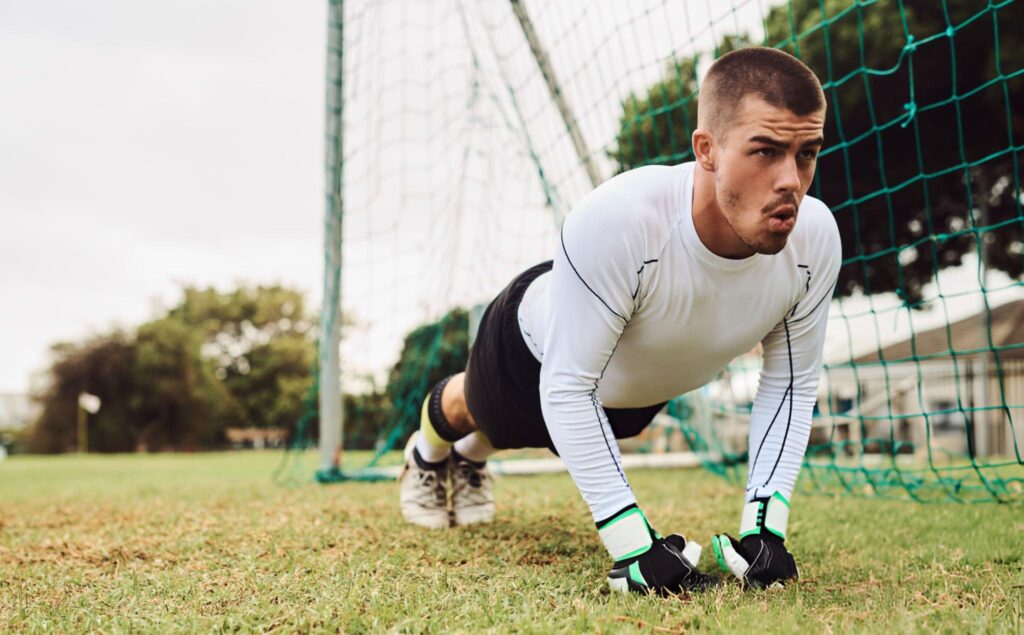In the world of football, where every second counts and every movement matters, staying fit isn’t just an advantage—it’s a necessity. Whether you’re a professional athlete or an enthusiastic amateur, optimizing your fitness can dramatically improve your performance on the pitch. Here are some essential fitness tips to help you elevate your game and dominate the field.
Football Fitness Revolution: Boost Your Game with These Tips
Cardio Conditioning: Building Stamina
Football is a game of continuous movement, requiring players to sprint, jog, and sometimes walk. To keep up with the dynamic nature of the game, cardiovascular conditioning is key.
High-Intensity Interval Training (HIIT)
One of the most effective ways to boost your cardiovascular fitness is through high-intensity interval training (HIIT). This method involves short bursts of intense exercise followed by brief recovery periods. For example, you might sprint for 30 seconds, then walk or jog for a minute. Repeat this cycle for 20-30 minutes to replicate the unpredictable pace of a football match. HIIT improves both aerobic and anaerobic fitness, allowing you to maintain peak performance throughout the game.
Steady-State Cardio
In addition to HIIT, incorporate steady-state cardio exercises like running, cycling, or swimming into your weekly routine. These activities enhance your overall cardiovascular health and build a solid aerobic base. Aim for at least 150 minutes of moderate-intensity cardio per week, as recommended by health experts.

Strength Training Power and Stability
Strength training isn’t just for bodybuilders—it’s crucial for football players too. Building muscle strength enhances your power and stability, crucial for tackling opponents and maintaining balance.
Compound Exercises
Focus on compound exercises such as squats, lunges, deadlifts, and bench presses. These movements target multiple muscle groups, helping you develop the explosive power needed for quick sprints and robust tackles. Here’s a breakdown of key exercises:
- Squats: Target the quads, hamstrings, and glutes. They are essential for lower body strength and power.
- Lunges: Improve balance and coordination while strengthening the legs.
- Deadlifts: Enhance overall body strength, particularly the back, glutes, and hamstrings.
- Bench Press: Develop upper body strength, crucial for pushing opponents away.
Plyometric Training
Incorporate plyometric exercises, such as box jumps, burpees, and medicine ball throws. Plyometrics improve your explosive power, agility, and coordination. These exercises mimic the rapid, dynamic movements in football, enhancing your performance on the field.
Flexibility and Agility: The Game Changers
Flexibility and agility are often overlooked, yet they play a significant role in a footballer’s performance. Regular stretching routines and agility drills can improve your range of motion and quickness on the field.

Dynamic Stretching
Before training or matches, engage in dynamic stretching to warm up your muscles and improve flexibility. Examples include leg swings, arm circles, and torso twists. Dynamic stretches prepare your body for the demands of football, reducing the risk of injury.
Agility Drills
Incorporate agility drills into your training regimen. Use ladder drills, cone drills, and shuttle runs to enhance your footwork, speed, and coordination. These drills improve your ability to change direction quickly and efficiently, a vital skill for evading opponents and making rapid plays.
Nutrition: Fueling Your Body
What you eat off the field directly impacts your performance on it. A balanced diet rich in proteins, carbohydrates, and healthy fats is essential.
Macronutrient Balance
- Proteins: Essential for muscle recovery and growth. Include lean meats, fish, eggs, and plant-based proteins like beans and lentils in your diet.
- Carbohydrates: Provide the energy required for intense physical activity. Opt for complex carbs like whole grains, fruits, and vegetables.
- Fats: Necessary for overall health and energy. Include healthy fats from sources like avocados, nuts, seeds, and olive oil.
Hydration
Staying hydrated is crucial for maintaining energy levels and preventing cramps. Drink plenty of water throughout the day, especially before, during, and after training sessions and matches. Consider electrolyte-replenishing drinks if you’re engaging in prolonged, intense activity.
Mental Fitness: The Unsung Hero
Football isn’t just a physical game; it’s a mental battle too. Enhancing your mental fitness can give you the edge over your opponents.
Visualization
Mindfulness and Meditation
Goal-Setting
Visualization involves mentally rehearsing your performance. Picture yourself making successful plays, scoring goals, and tackling opponents. This mental practice can boost your confidence and prepare you for real-game scenarios.
Practices like mindfulness and meditation can improve your focus, reduce stress, and enhance overall mental well-being. Spend a few minutes each day in quiet reflection, focusing on your breathing and clearing your mind of distractions.
Set clear, achievable goals for your training and performance. Break down your long-term objectives into smaller, manageable steps. This approach keeps you motivated and allows you to track your progress.
Integrating these fitness tips into your routine will not only boost your performance on the football field but also enhance your overall well-being. Remember, consistency is key. Keep pushing your limits, stay motivated, and watch your game reach new heights. Ready to transform your football fitness? Let’s hit the field and make every moment count!
Call to Action
Stay connected for more expert tips and updates. Follow us on social media to stay at the top of your game. Let’s conquer the field together!


